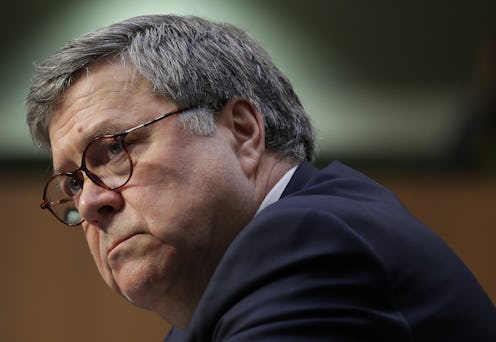News
Here’s What Trump’s Attorney General Pick Said About Roe V. Wade In His Hearing

During his Senate confirmation hearings, Attorney General-designate William Barr dodged a question about Roe v. Wade, refusing to tell senators whether or not, if confirmed, he would defend the landmark Supreme Court decision that legalized abortion. Although Barr said decades ago that he thought Roe should be overturned, on Tuesday he implied — though didn't outright state — that he wouldn't seek to have the ruling struck down if confirmed as the new U.S. attorney general.
Barr served as Attorney General in the 1990s under George H.W. Bush, and was nominated by President Trump in December to lead the Justice Department. During that time, Barr said at various points that Roe "does not have any constitutional underpinnings" and "should be overruled," as it wasn't "the right opinion."
On Tuesday, Barr softened his position a bit. In response to a question from Sen. Richard Blumenthal, Barr said that Republican administrations have stopped asking that Roe be overturned, and that he doesn't think this will change any time soon.
"I said in 1991 that I thought, as an original matter, [Roe] had been wrongly decided," Barr told senators. "And that was, what, within 18 years of its decision? Now it’s been 46 years, and the department has stopped — under Republican administrations — stopped, as a routine matter asking that it be overruled, and I don’t see that being turned — you know, I don't see that being resumed."
Ever since Anthony Kennedy retired from the Supreme Court and was replaced by Brett Kavanaugh, progressives have worried that the new conservative majority on the court might overturn or gut Roe. If confirmed to the Justice Department, Barr would not have any direct say over any decisions as monumental as this; however, he would have the authority to decide which cases concerning reproductive rights to prosecute, and which ones to opt out of.
Trump appointed Barr on Dec. 7, around a month after Jeff Sessions resigned as attorney general. The Justice Department is currently being led by Sessions' former chief of staff, Matthew Whitaker. Some legal experts believe that Whitaker's appointment as acting attorney general was unconstitutional, as he wasn't confirmed by the Senate. On Monday, however, the Supreme Court rejected a challenge to the legality of Whitaker's appointment.
During his testimony Tuesday, Barr was asked about the fate of Special Counsel Robert Mueller's probe into the Trump administration's Russia connections. Trump has spoken out against Mueller's investigation many times, and many speculated that he would appoint an attorney general who would quash the probe. But though Barr has criticized the Mueller investigation in the past, he told the Senate on Tuesday, in a pre-written statement, that "it is vitally important that the special counsel be allowed to complete his investigation."
"I will follow the special counsel regulations scrupulously and in good faith, and on my watch, Bob [Mueller] will be allowed to finish his work." Barr was Mueller's boss in the '90s, when Mueller led the Justice Department's criminal division under Barr's Justice Department.
But although Barr said that "it is very important that the public and Congress be informed of the results of the special counsel's work," he would not commit to releasing Mueller's final report in its entirety. Barr said that "where judgements are to be made" about whether to withhold certain components of the report, he "will make those judgements based solely on the law and I will not let personal, political or other improper interests influence my decision."
In 1992, Barr expressed a clear personal opposition to abortion, according to the Associated Press, telling a group of Roman Cathlolics that America is "in the midst of a great moral crisis" and that "secularists," in part, are responsible for "1.5 million children aborted each year."